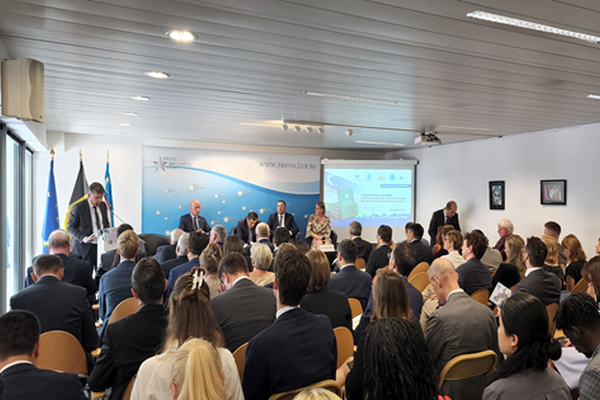
ISMI: Support for civil society institutions is a priority of the state policy of Uzbekistan
Tashkent, Uzbekistan (UzDaily.com) -- Support for civil society institutions is a priority of the state policy of Uzbekistan. This point of view was expressed by the First Deputy Director of the Institute for Strategic and Interregional Studies under the President of the Republic of Uzbekistan Akramjon Nematov, speaking at a round table on the topic “Constitutional reform: the basis for ensuring the rule of law, security, development of free and fair civil society”.
The event, organized at the Brussels Press Club with the support of the embassy of our country, was attended by representatives of the European Parliament, the EU Commission, the government and the Ministry of Foreign Affairs of the Kingdom of Belgium, experts from leading think tanks, the media of the host country, as well as the delegation of Uzbekistan headed by the Acting Minister of Foreign Affairs cases by Vladimir Norov.
Speaking with a report on the topic “The importance of the constitutional reform for the development of civil society in Uzbekistan”, A. Nematov noted that the main goal of the constitutional reform is to build a humane, democratic, legal, social and secular state, the formation of an open and fair civil society.
In particular, the First Deputy Director of ISMI drew attention to the fact that already in the draft preamble of the Constitution, for the first time, the desire of the people of Uzbekistan to build an open, harmonious and fair civil society is fixed. At the same time, the term “civil society” is used for the first time, a separate section is introduced devoted to its institutions, it is determined that political parties, trade unions, public funds, other non-governmental organizations, citizens’ self-government bodies, and the media form the basis of civil society.
The representative of the ISMI emphasized that for the first time the constitutional and legal obligation of the state to take measures to support civil society institutions, ensure their participation in the development and implementation of socio-economic programs, develop social partnership between state bodies and civil society institutions, and guarantee the implementation of public control.
In fact, A. Nematov noted that the state is already providing comprehensive support to the activities of civil society institutions, and recently this area has been elevated to the rank of a priority task of state policy. The constitutional and legal consolidation of guarantees for the freedom of activity of civil society institutions will give this work an even more systematic, sustainable and progressive character. In particular, according to him, in Uzbekistan, support for the development of civil society is carried out through the adoption of a whole range of comprehensive and interrelated measures of political, legal, socio-economic and socio-political orientation.
Among the political and legal measures, the expert noted the consolidation of the priority of the development of civil society in documents of a conceptual and strategic nature. Thus, in the adopted Strategy for the Development of New Uzbekistan for 2022-2026, the formation of an active and free civil society is defined as a priority of reforms. In addition, in 2021, President Shavkat Mirziyoyev approved the Concept for the Development of Civil Society in 2021-2025, among the key tasks of which is the creation of the necessary conditions for the active participation of civil society institutions in state and public administration.
According to A. Nematov, socio-economic measures included the allocation by the Parliament of Uzbekistan over the past four years of US$32.5 million to support more than 1.6 thousand NGO projects, which is 20% more than in 2010-2016. It was noted that 14 NGO houses have been created in all regions of the country, where about 500 organizations are placed on a gratuitous basis. Moreover, NGOs are exempted from paying more than 10 types of taxes and other obligatory payments, the state duty rates for their registration have been reduced by 25%.
Among the socio-political measures, the expert cited an increase in the status and role of civil society institutions as social partners of the state and subjects of public control. Thus, in 2018-2022, more than 100 public councils were created under state bodies, including law enforcement, with more than 50% of which are representatives of civil society institutions. In addition, in 2018, the President of Uzbekistan established the award "For Contribution to the Development of Civil Society", which has been awarded to 126 public activists to date.
All these and other measures together contribute today to the active participation of civil society institutions in the reforms being implemented in Uzbekistan, A. Nematov stated.
Previously, similar "round tables" were held in Washington, New York, London, Warsaw, Geneva, Moscow, Beijing, Seoul, Tokyo, New Delhi and other capitals of the partner states, during which the essence and significance of the constitutional reform were brought to light, constructive proposals from leading international experts were received.
The event was organized as part of the stay in the European capital of the delegation of Uzbekistan, headed by Acting Minister of Foreign Affairs Vladimir Norov and consisting of deputies of the Oliy Majlis, representatives of the ISMI and the Development Strategy Center.
During the trip, meetings were also held with EU High Representative for Foreign Affairs and Security Policy Joseph Borel, EU Commissioner for Justice Didier Reynders, Minister of Foreign Affairs, European Affairs, Foreign Trade and Federal Cultural Institutions of Belgium Hadja Lahbib, and also took part in the work Global Tourism Forum "Europe Leaders Summit 2022" on the theme "Investment, Connectivity and Hospitality".